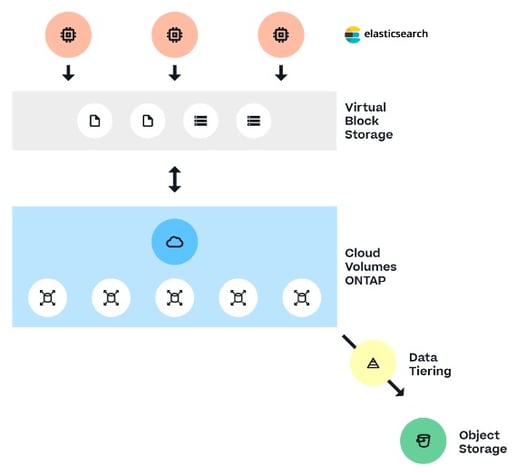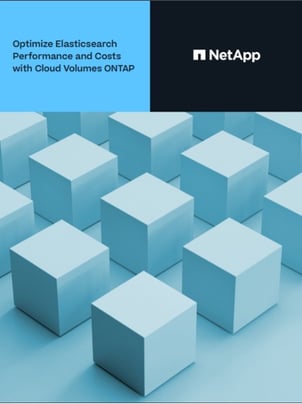More about Elasticsearch
Subscribe to our blog
Thanks for subscribing to the blog.
December 24, 2020
Topics: Cloud Volumes ONTAP DevOpsDatabaseAdvanced4 minute readAnalytics
With the growth in the volume and increasing complexity of production deployments and operational pipelines, managing logs and metrics is a crucial component of successful IT deployment. DevOps teams and administrators need logs and metrics to gain operational insights, meet their SLA obligations, prevent unauthorized access, and to identify errors, anomalies, or suspicious activity. For that, many companies turn to Elasticsearch.
But Elasticsearch comes with a host of challenges on its own, including ensuring high performance, data protection, and lowering costs for that large amount of data. How can you overcome these Elasticsearch optimization challenges? These are all areas where NetApp Cloud Volumes ONTAP can help.
How does this work? In our new ebook on Elasticsearch optimization with Cloud Volumes ONTAP we go in depth into how Elasticsearch users can enhance their deployments with Cloud Volumes ONTAP for improved performance, and reduced storage costs and operational overheads.
In this post, let’s take a look at some of the challenges that can come up in an Elasticsearch deployment which would require a solution like Cloud Volumes ONTAP to be used.
Elasticsearch Optimization Challenges
Elasticsearch is a distributed search engine and data analytics platform based on the Apache Lucene search and indexing library. While Elasticsearch is one of the most efficient systems for collecting, indexing, and unifying log, metrics, and other mission-critical data across different environments, there are challenges that can arise when running it in production at scale. Some of these challenges are:
- Ensuring high performance: With the growing volumes of data and its distributed storage (e.g., shards in Elasticsearch), ensuring low search latency becomes more and more challenging. Efficient and fast search requires agile storage infrastructure, network configuration, and optimization of every bit of your system.
- Higher storage costs: As volumes of data are ingested into your production clusters, more high-performance storage is required, increasing costs.
- Inefficient storage provisioning: With most cloud providers, companies need to pre-provision vast amounts of block storage which may stay idle during low traffic times. Under-utilization of storage entails unnecessary costs that can be avoided with storage tiering and thin provisioning.
- Data protection: Data needs to be protected from application and network failures and downtimes with an efficient backup mechanism and disaster recovery (DR) systems.
- Data retention planning: Due to high storage costs, companies adopt shorter log retention time windows which limit the flexibility of their data management strategy.
How can these performance and cost challenges that come with high-volume Elasticsearch deployments be solved? With NetApp Cloud Volumes ONTAP, Elasticsearch users can experience dramatic improvements in performance, and considerable reductions of storage costs and operational overheads for Elasticsearch clusters.
Elasticsearch Optimization with Cloud Volumes ONTAP
Cloud Volumes ONTAP is NetApp’s software-defined storage solution that provides enterprise storage features such as data protection, high availability, and storage efficiencies for cloud-based block storage on AWS, Azure, and Google Cloud. These capabilities, when used in conjunction with Elasticsearch can considerably improve performance and lower costs.
Elasticsearch optimization with Cloud Volumes ONTAP begins at the storage layer. When using Cloud Volumes ONTAP together with Elasticsearch, Cloud Volumes ONTAP serves as a storage management layer for the cloud volumes (e.g., Amazon EBS) used by Elasticsearch to store and manage data (see the image below).

This solution gives Elasticsearch users three essential benefits for their deployment: a clear boost in performance, significantly lower storage costs, and an overall reduction in operational overheads.
- Performance: NetApp benchmark tests show that the use of native cloud-based block storage can be improved with Cloud Volumes ONTAP—66% faster data querying, 86% more IOPS, and 223% more throughput—making Elasticsearch searches faster and more efficient.
- Storage Costs: With storage efficiency features and data tiering, Cloud Volumes ONTAP can reduce overall cloud data storage costs for Elasticsearch by 40%.
- Reduced Operational Overhead: A number of Cloud Volumes ONTAP features combine to reduce the operational overheads of Elasticsearch deployment, including multi-region high availability to ensure business continuity, cluster data cloning with NetApp FlexClone® technology, and improved data protection to recover from any form of data loss, whether due to accidental deletion, corruption, or ransomware attack.
Download the eBook for the Full Details
NetApp’s Cloud Volumes ONTAP is a powerful cloud storage management tool that provides a host of enterprise-grade features for cloud storage deployments. Its built-in storage deduplication, compression, data tiering, and thin provisioning can dramatically improve the performance of Elasticsearch deployments in the cloud and cut storage costs. High availability, data protection, and disc cloning features also decrease operational overheads for managing storage in the cloud making it easy for DevOps to ensure the fault tolerance of Elasticsearch deployments.
To find out more about Elasticsearch optimization with Cloud Volumes ONTAP, from enhanced performance to decreased storage costs, check out the full ebook here.

